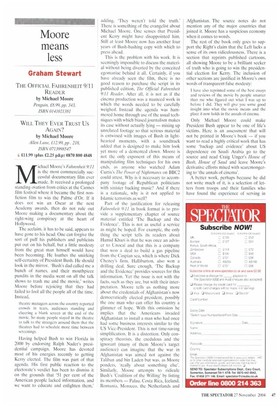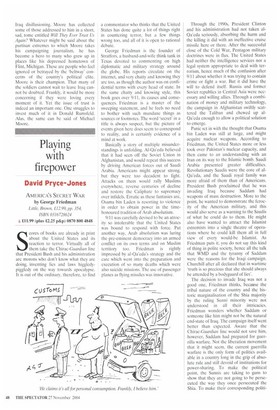Moore means less
Graham Stewart
THE OFFICIAL FAHRENHEIT 9/1 1 READER by Michael Moore
Penguin, £8.99, pp. 343, ISBN 0141021381
WILL THEY EVER TRUST US AGAIN? by Michael Moore Allen Lane, £12.99, pp. 218, ISBN 0713998547 & £11.99 (plus £2.25 p&p) 0870 800 4848 Michael Moore's Fahrenheii 9111 is the most commercially successful documentary film ever made. It received a prolonged standing ovation from critics at the Cannes film festival where it became the first nonfiction film to win the Palme d'Or. If it does not win an Oscar at the next Academy awards, then do not rule out Moore making a documentary about the right-wing conspiracy at the heart of Hollywood.
The acclaim, it has to be said, appears to have gone to his head. One can forgive the sort of puff his publishers and publicists put out on his behalf, but a little modesty from the great man himself would have been becoming. He loathes the smirking self-certainty of President Bush. He should look in the mirror. 'Bush's dad called me a bunch of names, and their mouthpiece pundits in the media went on all the talk shows to trash me and the movie,' writes Moore before rejoicing that they had failed to fool all the people all of the time. Instead,
theatre managers across the country reported crowds in tears, audiences standing and cheering a blank screen at the end of the movie. So many people stayed in the theatre to talk to the strangers around them that thc theatres had to schedule more time between screenings.
Having helped Bush to win Florida in 2000 by endorsing Ralph Nader's presidential campaign. Moore has devoted most of his energies recently to getting Kerry elected. The film was part of that agenda. His first public reaction to the electorate's verdict has been to dismiss it on the grounds that '51 per cent of the American people lacked information, and we want to educate and enlighten them,' adding, "They weren't told the truth.' There is something of the evangelist about Michael Moore. One senses that President Kerry might have disappointed him. Still at least Moore now has another four years of Bush-bashing copy with which to press ahead.
This is the problem with his work. It is seemingly impossible to discuss the material without being diverted by the conceited egomaniac behind it all. Certainly, if you have already seen the film, there is no good reason to purchase the script in its published edition, The Official Fahrenheit 9/11 Reader. After all, it is not as if the cinema production was a nuanced work in which the words needed to be carefully weighed. Instead the agenda was hammered home through use of the usual techniques with which biased journalism makes its case without actually lying — mixing up unrelated footage so that serious material is entwined with images of Bush in lighthearted moments, with a soundtrack added that is designed to make him look yet more of a demented clown. Moore is not the only exponent of this means of manipulating film techniques for his own ends, as anyone who watched Adam Curtis's The Power of Nightmares on BBC2 could attest. Why is it necessary to accompany footage of Republican politicians with sinister backing music? And if there is a rationale, why is it not applied to Islamic terrorists as well?
Part of the justification for releasing Fahrenheit 9/11 in book format is to provide a supplementary chapter of source material entitled 'The Backup and the Evidence'. This is not as useful a service as might be hoped. For example, the only thing the script tells its readers about Hamid Khazi is that he was once an adviser to Unocal and that this is a company that won a deal to build a gas pipeline from the Caspian sea, which is where Dick Chenev's firm, Halliburton, also won a drilling deal. Sure enough, 'The Backup and the Evidence' provides sources for this information. Yet the issue is not with the facts, such as they are, but with their interpretation. Moore tells us nothing more about the credentials of Afghanistan's now democratically elected president, possibly the one man who can offer his country a glimmer of hope. With this omission he implies that the Americans invaded Afghanistan to install a man who had once had sonic business interests similar to the US Vice-President. This is not time-saving simplification. It is a distortion. Only conspiracy theorists, the credulous and the ignorant (many of them Moore's target audience) can imagine that the war in Afghanistan was aimed not against the Taliban and bin Laden but was, as Moore ponders, 'really about something else'. Similarly, Moore attempts to ridicule Bush's 'Coalition of the Willing' by listing its members — Palau, Costa Rica, Iceland, Romania, Morocco, the Netherlands and
Afghanistan. The source notes do not mention any of the major countries that joined it. Moore has a suspicious economy when it comes to words.
The rest of the book only goes to support the Right's claim that the Left lacks a sense of its own ridiculousness. There is a section that reprints published cartoons, all showing Moore to be a brilliant seeker of truth who is going to win the presidential election for Kerry. The inclusion of other sections are justified in Moore's own words of transparent false modesty:
have also reprinted some of the hest essays and reviews of the movie by people smarter than mc who figured out what I was up to before I did. They will give you some good insight into what the movie means and the place it now holds in the annals of cinema.
Only Michael Moore could make President Bush appear to be one of life's victims. Here is an assessment that will not be printed in Moore's book — if you want to read a highly critical work that has some 'backup and evidence' about US dependence on Saudi Arabia go to the source and read Craig Unger's House of Bush, House of Saud and leave Moore's derivative efforts mixed with scaremongering to 'the annals of cinema'.
A better work, perhaps because he did not write much of it, is a selection of letters from troops and their families who have found the experience of serving in Iraq disillusioning. Moore has collected some of those addressed to him in a short, sad, tome entitled Will They Ever Trust Us Again? Whatever might be said about the partisan extremes to which Moore takes his campaigning journalism, he has become a hero to many who grew up in places like his depressed hometown of Flint, Michigan. These are people who feel ignored or betrayed by the 'beltway' concerns of the country's political elite. Moore is their champion. That many of the soldiers cannot wait to leave Iraq cannot be doubted. Frankly, it would be more concerning if they were loving every moment of it. Yet the issue of trust is indeed an important one. One struggles to invest much of it in Donald Rumsfeld. Alas, the same can be said of Michael Moore.



















































































 Previous page
Previous page